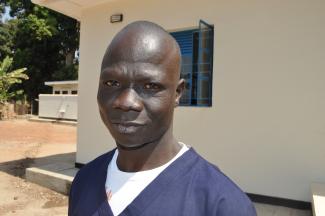<p>March 2018 — South Sudan has one of the world’s highest rates of maternal mortality, with postpartum hemorrhage, or excessive bleeding immediately after childbirth, one of the main causes. Less than 20 percent of births in the country between 2011 and 2016 were assisted by a skilled birth attendant — the lowest rate in the world, <a href="https://data.unicef.org/topic/maternal-health/delivery-care/"><strong>a… to UNICEF</strong></a>.</p>
<p>Expectant mothers who are lucky enough to deliver in a clinic or hospital are used to female midwives attending to them. A few years ago, however, Richard Yona became the first male midwife in South Sudan’s Western Equatoria state, an area bordering the Democratic Republic of the Congo and Central African Republic that is approximately the size of Serbia or the U.S. state of South Carolina.</p>
<p>In 2011, Yona, now 32, began working in Yambio, the main town of the region. In the beginning, other men teased him for doing what they assumed was a woman’s job. But the positive feedback from women whose babies he helped deliver made him a household name.</p>
<p>“Sometimes when I go to the villages, some women from nowhere will call me saying, ‘Richard, come and see the children you helped us deliver.’ They would gather the children and say, ‘See, these are all your children!’ That would be a moment of excitement and we would laugh,” said Yona.</p>
<p>He added that, sometimes when he goes to the marketplace, women recognize him and some say, “Richard, do you know you saved my life?”</p>
<p>Why did a man from a traditional background with fixed gender roles decide to become a midwife? “Because I want to save lives,” Yona said.</p>
<p>And he has saved lives. For the six years he has been practicing as a midwife, Yona says all the births he has assisted have been successful, with no infant deaths. He has not kept count of the number of babies he has helped deliver.</p>
<p>Yona is one of four midwives (two men and two women) working at the USAID-supported Bazungua primary health care clinic in Yambio, which serves more than 16,000 people. An average of 15 babies are delivered per month at the clinic.</p>
<p>Volunteer home health promoters at the Bazungua clinic go door-to-door in the surrounding villages to deliver messages on safe delivery, including the importance of regularly visiting the clinic for antenatal care. They encourage expectant mothers to deliver their babies at the clinic to help prevent maternal and newborn deaths and complications. But for those women who deliver their babies at home, the home health promoters distribute misoprostol to prevent excessive bleeding.</p>
<p>Volunteer male family planning advocates, known as “male champions,” also inform their peers about the benefits of expectant mothers delivering at the clinic and the importance of child spacing for maternal health.</p>
<p>The <a href="http://www.hpfsouthsudan.org/"><strong>Health Pooled Fund</strong></a> — funded by the United States (through USAID), the United Kingdom, the European Union, Canada and Sweden — is providing essential basic health care in eight of South Sudan’s 10 legacy states (since 2015, the government has divided the 10 states into 32).</p>
<p><strong>LINKS</strong></p>
<div class="wysiwyg-style-related-link"><strong><a href="https://www.usaid.gov/south-sudan">USAID’s mission in South Sudan</a></strong></div>
<div class="wysiwyg-style-related-link"><b><a href="https://www.usaid.gov/what-we-do/global-health/maternal-and-child-healt… work in maternal and child health</a></b></div>
<div class="wysiwyg-style-related-link"><strong><a href="https://www.usaid.gov/results-data/success-stories/managing-hiv-conflic… HIV in a South Sudan Conflict Zone</a></strong></div>
<div class="wysiwyg-style-related-link"><strong><a href="https://www.usaid.gov/results-data/success-stories/cash-training-progra… Supports Vulnerable Families in South Sudan</a></strong></div>
<p>Follow <strong><a href="https://twitter.com/USAIDSouthSudan">@USAIDSouthSudan</a></strong>, on <strong><a href="https://www.facebook.com/USAIDSouthSudan/">Facebook</a></strong></p>
,“Sometimes when I go to the villages, some women from nowhere will call me saying, ‘Richard, come and see the children you helped us deliver.’”

Victor Lugala, USAID
